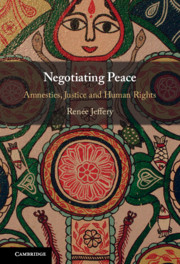Conclusion
Published online by Cambridge University Press: 04 March 2021
Summary
In the 1990s, United Nations (UN) peacemaking policy and practice underwent a significant transition. At the beginning of the decade, UN practice followed a long-standing tradition of accepting, condoning and even promoting the use of amnesties in peace agreements. By the turn of the century, however, it had instituted a new ‘policy of opposing amnesties for war crimes, crimes against humanity, genocide or gross violations of human rights, including in the context of peace negotiations’.1 As the UN High Commissioner for Human Rights remarked in the Foreword to the UN’s Rule-of-Law Tools for Post-Conflict States: Amnesties: ‘The United Nations has recognized that, when properly pursued, justice can help ensure a just and sustainable peace. By opposing amnesties that establish impunity for atrocious crimes, United Nations policy seeks to safeguard a space for justice even when conditions for prosecutions are not yet adequately established.’2 This shift, Pillay noted, ‘represents an important evolution’ in UN peacemaking policy.3
- Type
- Chapter
- Information
- Negotiating PeaceAmnesties, Justice and Human Rights, pp. 197 - 212Publisher: Cambridge University PressPrint publication year: 2021

